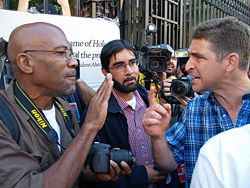
Staring
Encyclopedia

Visual perception
Visual perception is the ability to interpret information and surroundings from the effects of visible light reaching the eye. The resulting perception is also known as eyesight, sight, or vision...
interest, for an amount of time. Staring can be interpreted as being either hostile, or the result of intense concentration
Concentration
In chemistry, concentration is defined as the abundance of a constituent divided by the total volume of a mixture. Four types can be distinguished: mass concentration, molar concentration, number concentration, and volume concentration...
or affection. Staring behaviour can be considered a form of aggression, or an invasion of an individual's privacy. If eye contact
Eye contact
Eye contact is a meeting of the eyes between two individuals.In human beings, eye contact is a form of nonverbal communication and is thought to have a large influence on social behavior. Coined in the early to mid-1960s, the term has come in the West to often define the act as a meaningful and...
is reciprocated, mutual staring can take the form of a battle of wills, or even a game where the loser is the person who blinks or looks away first – a staring contest
Staring contest
A staring contest is a game in which two people stare into each other's eyes and attempt to maintain eye contact for a longer period of time than their opponent. The game ends when one participant intentionally or unintentionally looks away...
.
To some extent, the meaning of a person’s staring behaviour depends upon the attributions made by the observer. Staring often occurs accidentally, when someone appears to be staring into space they may well be lost in thought, or stupefied, or simply unable to see.
Staring conceptually also implies confronting the inevitable – ‘staring death in the face’, or ‘staring into the abyss’. Group staring evokes and emphasises paranoia
Paranoia
Paranoia [] is a thought process believed to be heavily influenced by anxiety or fear, often to the point of irrationality and delusion. Paranoid thinking typically includes persecutory beliefs, or beliefs of conspiracy concerning a perceived threat towards oneself...
; such as the archetypal stranger walking into a saloon in a Western
Western (genre)
The Western is a genre of various visual arts, such as film, television, radio, literature, painting and others. Westerns are devoted to telling stories set primarily in the latter half of the 19th century in the American Old West, hence the name. Some Westerns are set as early as the Battle of...
to be greeted by the stares of all the regulars. The fear of being stared at is called Scopophobia
Scopophobia
Scopophobia or scoptophobia is an anxiety disorder characterized by a morbid fear of being seen or stared at by others. It is related to Ophthalmophobia.In the 1906 psychiatric journal The Alienist and Neurologist, scopophobia was described:...
.
Social factors

Children have to be socialised into learning acceptable staring behaviour. This is often difficult because children have different sensitivities to self-esteem
Self-esteem
Self-esteem is a term in psychology to reflect a person's overall evaluation or appraisal of his or her own worth. Self-esteem encompasses beliefs and emotions such as triumph, despair, pride and shame: some would distinguish how 'the self-concept is what we think about the self; self-esteem, the...
. Staring is also sometimes used as a technique of flirting
Flirting
Flirting is a playful, romantic, or sexual overture by one person to another subtly indicating an interest in a deeper relationship with the other person, and can involve verbal communication as well as body language...
with an object of affection. Staring behaviour is a highly common form of social interaction amongst Argentinians.
Jean-Paul Sartre
Jean-Paul Sartre
Jean-Paul Charles Aymard Sartre was a French existentialist philosopher, playwright, novelist, screenwriter, political activist, biographer, and literary critic. He was one of the leading figures in 20th century French philosophy, particularly Marxism, and was one of the key figures in literary...
discusses "The look" in Being and Nothingness, in which the appearance of someone else creates a situation in which a person's subjectivity
Subjectivity
Subjectivity refers to the subject and his or her perspective, feelings, beliefs, and desires. In philosophy, the term is usually contrasted with objectivity.-Qualia:...
is transformed without their consent.
Psychological study
The act of staring implies a visual focus, where the subject of the gaze is objectified. This has been the subject of psychoanalytical studies on the nature of scopophiliaScopophilia
Scopophilia or scoptophilia, from Greek "love of looking", is deriving pleasure from looking. As an expression of sexuality, it refers to sexual pleasure derived from looking at erotic objects: erotic photographs, pornography, naked bodies, etc....
, with a subsequent development in some aspects of feminist thought (see Gaze
Gaze
Gaze is a psychoanalytical term brought into popular usage by Jacques Lacan to describe the anxious state that comes with the awareness that one can be viewed. The psychological effect, Lacan argues, is that the subject loses some sense of autonomy upon realizing that he or she is a visible object...
, film
Film
A film, also called a movie or motion picture, is a series of still or moving images. It is produced by recording photographic images with cameras, or by creating images using animation techniques or visual effects...
, photography
Photography
Photography is the art, science and practice of creating durable images by recording light or other electromagnetic radiation, either electronically by means of an image sensor or chemically by means of a light-sensitive material such as photographic film...
and voyeurism
Voyeurism
In clinical psychology, voyeurism is the sexual interest in or practice of spying on people engaged in intimate behaviors, such as undressing, sexual activity, or other activity usually considered to be of a private nature....
).
Paradoxically, the notion of staring also implicates the looker in constructing themselves as a subject. Sartre was interested in the individual experiencing shame only when they perceive that their shameful act is being witnessed by another. (see The look)
The Psychic Staring Effect
The Psychic Staring Effect is concept of 'non-visual detection of staring'. The idea that people can feel that they are being stared at has been studied heavily, by many different researchers, with different results.Rupert Sheldrake
Rupert Sheldrake
Rupert Sheldrake is an English scientist. He is known for having proposed an unorthodox account of morphogenesis and for his research into parapsychology. His books and papers stem from his theory of morphic resonance, and cover topics such as animal and plant development and behaviour, memory,...
in a controversial book in 2003 called "The Sense of Being Stared At" writes:
Anecdotal evidence
The expression anecdotal evidence refers to evidence from anecdotes. Because of the small sample, there is a larger chance that it may be true but unreliable due to cherry-picked or otherwise unrepresentative of typical cases....
suggesting that this is the case. Many people have had the experience of feeling that they are being looked at, and on turning around find that they really are. Conversely, many people have stared at other people's backs, for example in a lecture theater, and watched them become restless and then turn round."

